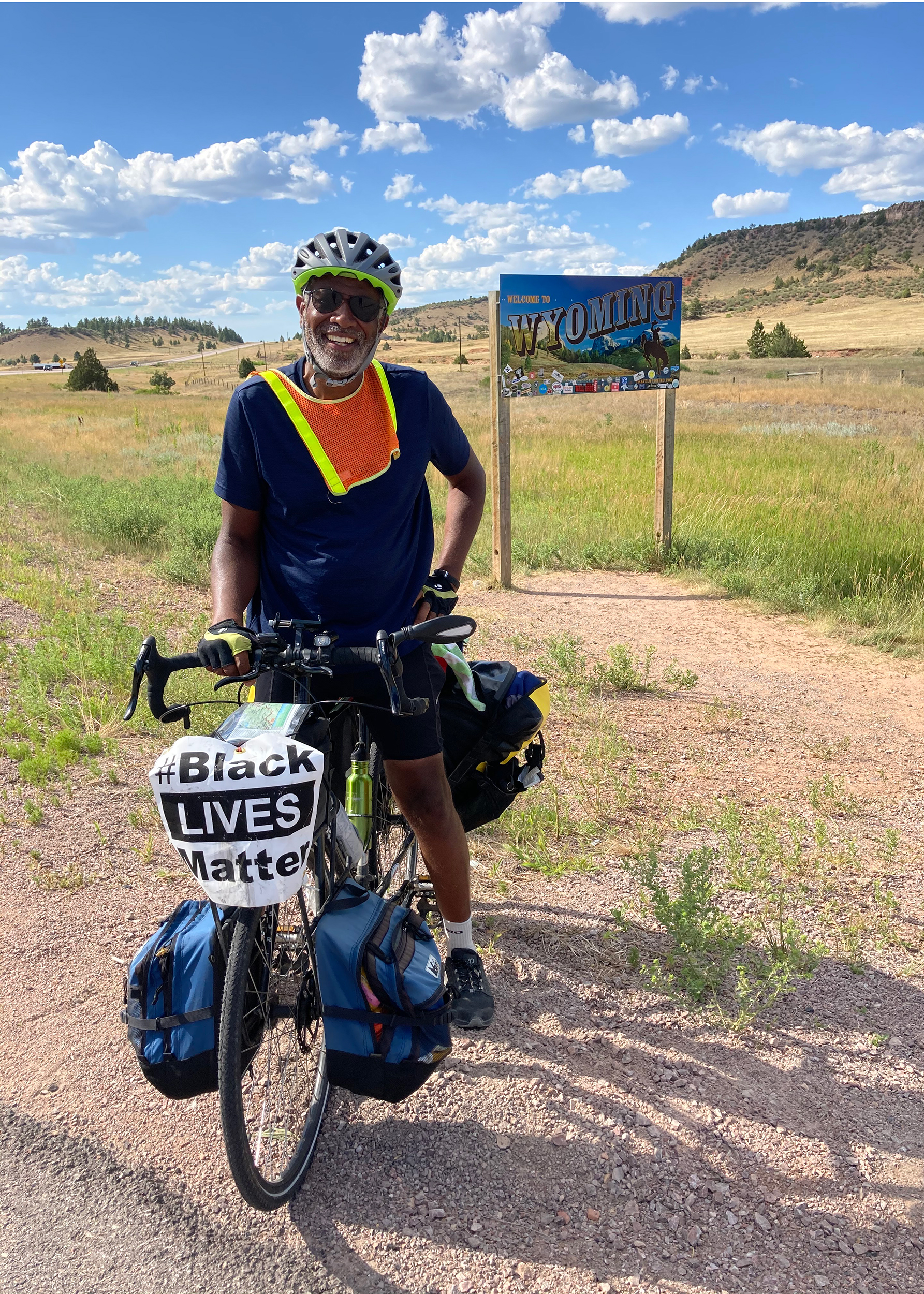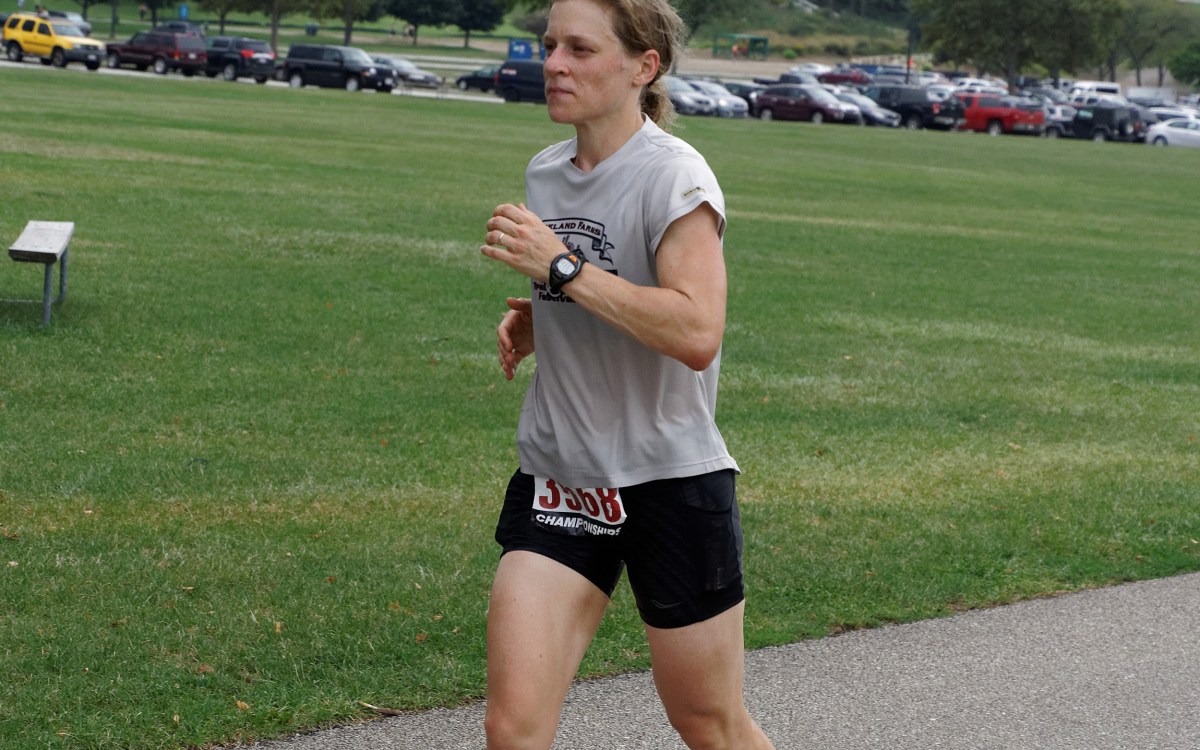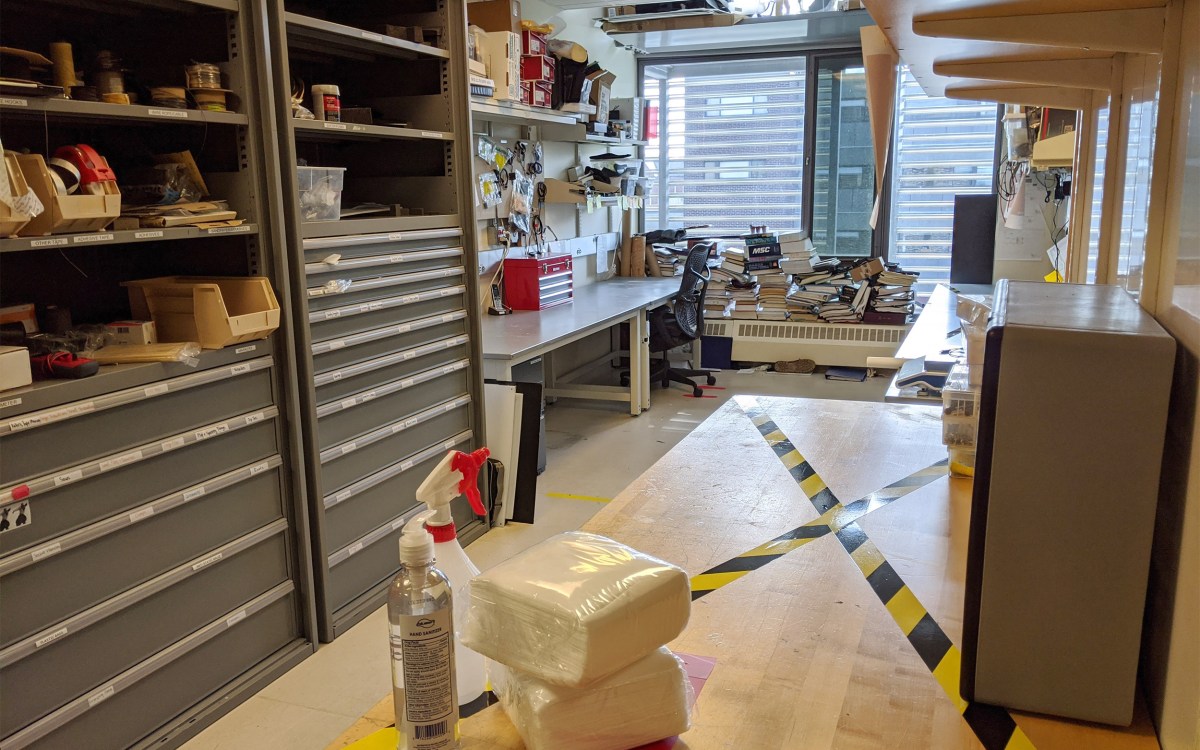Going the distance for himself and a larger purpose
Prof cycles across U.S. to raise awareness for BLM, Black Birders Week
Video and images courtesy of Scott Edwards
The past few days had been nothing but narrow-shouldered highways and bumpy gravel roads. Put another way, they’d been enough to make most bicyclists shake their fists at the heavens, said Scott V. Edwards, a professor in the Department of Organismic and Evolutionary Biology.
It’s a feeling Edwards had gotten to know well. After all, the 57-year-old ornithologist has been cycling across the nation since June 6 in a trek that largely began as a way to fulfill a lifelong goal but became something bigger as the nation began a reckoning with racial injustice.
The journey started in Newburyport, Mass., after Edwards dipped his tires in the Atlantic Ocean. He hopes to reach the Oregon coast sometime during the second week of August. There, he plans on touching the Pacific. Covering about 50 to 60 miles a day, he’s getting closer every day, but not every mile is majestic. Some are downright grueling.
“I’ve had some great roads with very wide shoulders and few cars,” said Edwards, who’s also the Alexander Agassiz Professor of Zoology and Curator of Ornithology in the Museum of Comparative Zoology. “And I’ve had some roads that make you think you’ve been sent to hell.”
Take the unpaved obstacle course he traversed in western Iowa a month into his journey. That was one of the bad ones, he said. It was narrow, hard to pedal, and the shoulder was nothing but stones. Edwards had to pull off to the side and come to a full stop each time a car or truck passed. And all that with a bicycle that weighed about 100 pounds because of all the supplies on it. “Those are the points where you, kind of, say: ‘What am I doing here?’” Edwards said.
Part of the answer can be read on the signs fixed to his bike. They are in support of Black Lives Matter, Black Birders Week, and #ShutDownSTEM, a one-day work stoppage held in June to spark action against systemic racism in the scientific and academic communities.
Edwards notes that the trip was one he’d longed to make for years. But as a Black birder and a Black scientist, he decided he also wanted to raise awareness of the movements and give his trip a larger purpose as racial tensions across the country continued to escalate. He added the signs a few days after setting out.
“It’s important for folks to see that African Americans do enjoy nature. It’s important to showcase that we like camping and show it’s not just the domain of white people,” Edwards said.
With the pandemic clearing his summer schedule of commitments like conferences or lab work, he decided in the spring it was finally time. He vaguely mapped out a route that would take him from the Atlantic to the Pacific, promised to send his two daughters (one of whom recently cycled across the U.S.) pictures of every dog he met on the way, and set a departure date.
Edwards starts cycling at about 8:30 a.m. every day after having breakfast, usually cereal, and plotting the day’s course. If he’s in a town, he’ll sometimes indulge in some bacon and eggs.
It’s pretty much straight riding after that. He stops every 15 miles or so for a drink or snack. Lunch consists of a lot of peanut butter and jelly sandwiches. Edward stops at about 4 or 5 p.m. on a good day. On a slow day, it’s not until about 7 p.m. He sleeps mainly at campgrounds. There have been a few homestays, though, and the occasional hotel.
“I’m not like a purist in that regard,” Edwards said. “I’m a pretty regular guy. I often joke that bike touring is the one sport that you can do well and still have a paunch.”
Entering Wyoming.

Still, while Edwards doesn’t consider himself elite, he is no pushover. He is making the trip unassisted. There’s no van following him carrying his stuff. His bicycle, which he aptly calls the “aircraft carrier,” is loaded with bags carrying food, snacks, and supplies like a tent and spare clothes. He restocks at stores he passes en route, always wearing a mask and social distancing.
The trip has been filled with sights, sounds, and people from across the nation. Edwards has documented much of it on his newly created Twitter account, @ScottVEdwards1.
On June 13, a woman in Cortland, N.Y., yelled out of her car for him to pull over so she could buy him an ice cream at a local drive-in diner. On June 24, he was treated to dinner in Bowling Green, Ohio. He calls these experiences random acts of kindness. Some of them have been because of the signs. People have also waved, honked, or thanked him for raising awareness.
Some experiences haven’t been as rosy.
On June 26, Edwards tweeted that he’d gotten his first racist comment of the trip from an 84-year-old white man in Monroeville, Ind. The man said, “Blacks got here when God ran out of white paint.” Edwards received a flood of support online, but pointed out it’s something that happens all too often to people of color, even in academia.
“That kind of humor was acceptable in his time, and he just doesn’t realize that the world has changed,” Edward said. He’s also noticed that in some rural communities, the movement has been associated with looting and violence. He tries to reason with people who think that, he said.
On the Fourth of July, Edwards spent some time in Galesburg, Ill., the hometown of the founder of population genetics Sewall Wright. He visited the cottage where the poet Carl Sandburg was born, and the site of an 1858 debate between Abraham Lincoln and Stephen A. Douglas. After that, he crossed over the Mississippi River and entered Iowa.
On July 23, he found himself staring in awe at the Black Hills in South Dakota. And five days later, he’d made it to the Crow Reservation in Montana and was heading for Billings.
Music has gotten Edwards through a lot of the trip. He plays 1970s rock to get him up some of the steeper hills. When things are mellow, he plays anything from Joni Mitchell and Aretha Franklin to Suzanne Vega and Stevie Wonder. Edwards doesn’t use headphones so he can hear traffic.
He also spends a lot of time listening for birds. He’s seen and heard horned larks in northern Ohio, a dickcissel in Indiana, killdeers, and the invasive Eurasian collared doves in Iowa.
Birding and the outdoors have interested Edwards since he was a child. He grew up in Riverdale, a neighborhood of the Bronx, which in the 1970s was “fairly rural,” he said. As a child, he read National Geographic and went camping with his family regularly. A neighbor introduced him to birdwatching.
His interest in science followed him to Harvard, where he graduated with a degree in biology in 1986 before earning a Ph.D. in zoology from the University of California, Berkeley, in 1992. His research focuses on avian biology, including their genetic variation and evolutionary history.
Science was always an option he was encouraged to pursue, Edwards said. He wants other children of color to have the same opportunity. He hopes to see more diversity among science professionals and faculty ranks.
“It’s all about role models,” Edwards said. “People need to see people like themselves out there … they need to be told that they belong in science and that there’s a place for them.”
Reflecting on the journey, Edwards said he’s developed his own hypothesis on cycling and science: The two are a lot alike, he said, especially when it comes to grinding through challenges, like bumpy roads or a mountain of complex data, to get where you’re going.
“Realize that the landscape, the circumstances, and occasionally even people will get in your way,” he said. “You just got to prove them wrong.”






